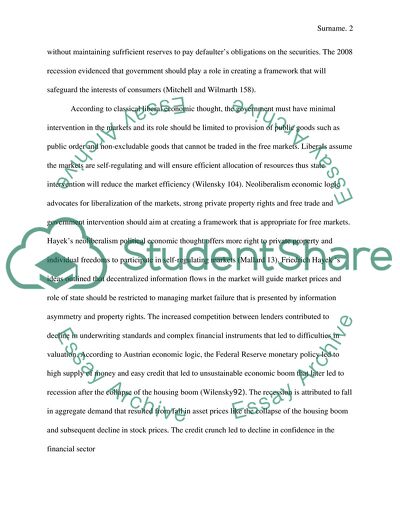
- Home
- Free Samples
- Premium Essays
- Editing Services
- Extra Tools
- Essay Writing Help
- About Us
- Studentshare
- Subjects
- Miscellaneous
- 2008 economic recession
2008 economic recession - Essay Example

- Subject: Miscellaneous
- Type: Essay
- Level: Ph.D.
- Pages: 4 (1000 words)
- Downloads: 0
- Author: rbergstrom
Extract of sample "2008 economic recession"
ed for pioneering economic discipline through his publication of the ‘Wealth of Nations’ that outlined that free markets create efficiency in allocation of resources thus leading to more benefits to the society (Sackrey 10). Adam Smith outlined that the invisible hand guides free markets and capitalism through enhanced competition of scarce resources since enterprises pursue self-interests and thus government intervention is not needed. However, the invisible hand created market inefficiency since financial institution executives pursued self-interests through awarding themselves high executive compensation and imprudent lending practices.
For instance, Fannie Mae had lax lending practices while investment banks like Goldman Sachs and American International Group (AIG) issued mortgage backed securities without maintaining sufrficient reserves to pay defaulter’s obligations on the securities. The 2008 recession evidenced that government should play a role in creating a framework that will safeguard the interests of consumers (Mitchell and Wilmarth 158). According to classical liberal economic thought, the government must have minimal intervention in the markets and its role should be limited to provision of public goods such as public order and non-excludable goods that cannot be traded in the free markets.
Liberals assume the markets are self-regulating and will ensure efficient allocation of resources thus state intervention will reduce the market efficiency (Wilensky 104). Neoliberalism economic logic advocates for liberalization of the markets, strong private property rights and free trade and government intervention should aim at creating a framework that is appropriate for free markets. Hayek’s neoliberalism political economic thought offers more right to private property and individual freedoms to participate in self-regulating markets (Mallard 13).
Friedrich Hayek ‘s ideas outlined that decentralized information flows in the market will guide
...Download file to see next pages Read More
- TERMS & CONDITIONS
- PRIVACY POLICY
- COOKIES POLICY